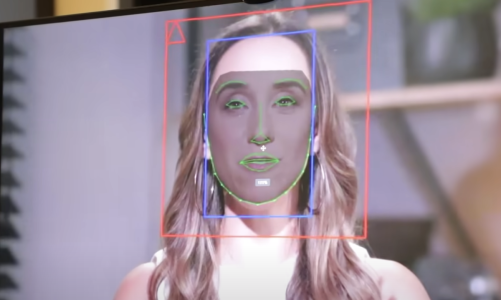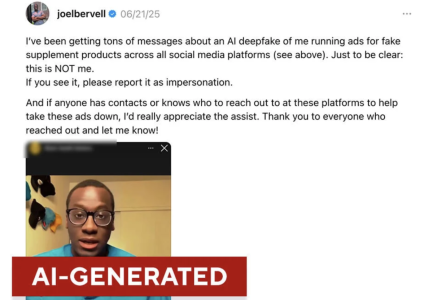The online "doctor" you’re watching might not be real
By
Veronica E.
- Replies 0
Imagine scrolling through social media and spotting a doctor confidently recommending a “miracle” treatment for weight loss, pain relief, or even reversing aging.
The white coat, calm tone, and professional background all look convincing—but the person you’re watching might not exist at all.
Advances in artificial intelligence are making it easy for scammers to create deepfake videos that mimic real doctors or invent entirely fake ones.
These clips are being used to sell questionable products and spread dangerous health misinformation to millions of viewers.
As this technology spreads, the challenge of knowing who—and what—to trust online is becoming more urgent.

Dr. Joel Bervell, known on social media as the “Medical Mythbuster,” discovered a deepfake video featuring his likeness promoting a product he had never endorsed.
The voice wasn’t his, but the face was an almost perfect match.
CBS News found over 100 similar videos across social media such as Facebook and YouTube, many linked to fake accounts pushing supplements, beauty creams, and other health-related products.
Some of these deepfakes amassed millions of views, spreading misinformation at alarming speed.
Creating a deepfake doctor can take as little as a few photos or short video clips of a real person.
AI tools can then generate a realistic moving and talking version, often paired with an AI-generated voice.
While some voices sound flat or unnatural, the visuals can be convincing enough to fool viewers—especially on small phone screens.
Cybersecurity experts like Martina López from ESET have documented dozens of accounts using this tactic, warning that the trend is growing as the technology becomes more accessible.

Many people turn to the internet for quick health tips or to research symptoms, but deepfake videos raise the risk of acting on false or dangerous advice.
Fake endorsements of “miracle cures” can lead people to waste money, delay proper treatment, or follow harmful recommendations.
Dr. Bervell warns that deepfakes also erode trust in legitimate medical professionals, making it harder for patients to know which advice is credible.
TikTok (a social media site) says it removed over 94% of policy-violating AI content proactively in early 2024.
Meta (which owns Facebook and Instagram) says it is improving enforcement tools but admits scammers adapt quickly.
YouTube allows removal requests for impersonation but may not take down videos unless they meet its criteria for harm or misinformation, meaning some deepfakes remain online.
The spread of deepfake doctors is part of a broader crisis of trust in online information.
As Dr. Bervell notes, fabricated videos can distort public understanding of science and medicine, leaving people unsure of what to believe.
While technology can make misinformation more convincing, awareness and skepticism remain the strongest defenses.
Read next: Crackdowns aren’t enough: A global threat continues to grow

Have you ever seen a medical video online that seemed suspicious? What steps do you take to make sure the health advice you follow is credible? Share your thoughts in the comments below!
The white coat, calm tone, and professional background all look convincing—but the person you’re watching might not exist at all.
Advances in artificial intelligence are making it easy for scammers to create deepfake videos that mimic real doctors or invent entirely fake ones.
These clips are being used to sell questionable products and spread dangerous health misinformation to millions of viewers.
As this technology spreads, the challenge of knowing who—and what—to trust online is becoming more urgent.

Digital impersonations are making it harder to know which medical advice to trust online. Image Source: YouTube / Al Jazeera English.
The rise of deepfake doctors
Dr. Joel Bervell, known on social media as the “Medical Mythbuster,” discovered a deepfake video featuring his likeness promoting a product he had never endorsed.
The voice wasn’t his, but the face was an almost perfect match.
CBS News found over 100 similar videos across social media such as Facebook and YouTube, many linked to fake accounts pushing supplements, beauty creams, and other health-related products.
Some of these deepfakes amassed millions of views, spreading misinformation at alarming speed.
Also read: Melania Trump quietly makes history with surprising role in new online safety law
How they’re made
Creating a deepfake doctor can take as little as a few photos or short video clips of a real person.
AI tools can then generate a realistic moving and talking version, often paired with an AI-generated voice.
While some voices sound flat or unnatural, the visuals can be convincing enough to fool viewers—especially on small phone screens.
Cybersecurity experts like Martina López from ESET have documented dozens of accounts using this tactic, warning that the trend is growing as the technology becomes more accessible.

Dr. Joel Bervell warns followers about an AI-generated video impersonating him to promote fake supplement ads. Image Source: CBS News / Dr. Joel Bervell.
Also read: Protect your privacy: 7 things you should not share online
Why it matters for your health
Many people turn to the internet for quick health tips or to research symptoms, but deepfake videos raise the risk of acting on false or dangerous advice.
Fake endorsements of “miracle cures” can lead people to waste money, delay proper treatment, or follow harmful recommendations.
Dr. Bervell warns that deepfakes also erode trust in legitimate medical professionals, making it harder for patients to know which advice is credible.
Also read: Is your personal information being misused? How stolen identities are costing taxpayers billions
How to spot a deepfake doctor
- Look for visual glitches: Blurred edges, flickering, or odd facial distortions when the person moves.
- Listen closely: Robotic or monotone voices lacking natural emotion are a common giveaway.
- Be skeptical of big claims: Phrases like “guaranteed results” or “more effective than Ozempic” should raise red flags.
- Verify credentials: Search the doctor’s name independently to confirm their license and affiliations.
- Avoid suspicious links: Instead of clicking in-video links, look up products or advice through reputable sources like the Mayo Clinic or CDC.
- Report fakes: Use platform tools to flag suspicious content—platforms rely on user reports to act.
Also read: When AI goes too far: Sexualized content mimicking Down syndrome sparks outrage
What platforms are doing
TikTok (a social media site) says it removed over 94% of policy-violating AI content proactively in early 2024.
Meta (which owns Facebook and Instagram) says it is improving enforcement tools but admits scammers adapt quickly.
YouTube allows removal requests for impersonation but may not take down videos unless they meet its criteria for harm or misinformation, meaning some deepfakes remain online.
The bigger picture: trust and information
The spread of deepfake doctors is part of a broader crisis of trust in online information.
As Dr. Bervell notes, fabricated videos can distort public understanding of science and medicine, leaving people unsure of what to believe.
While technology can make misinformation more convincing, awareness and skepticism remain the strongest defenses.
Read next: Crackdowns aren’t enough: A global threat continues to grow
Key Takeaways
- AI-generated deepfake videos are being used to impersonate doctors and promote unverified health products on social media.
- Scammers can create convincing deepfakes from just a few images or clips, making them difficult to detect, especially on small screens.
- Platforms like TikTok, Instagram, Facebook, and YouTube have removed flagged deepfake videos, but enforcement remains a challenge.
- Experts recommend watching for visual or audio glitches, questioning bold claims, verifying credentials, and reporting suspicious content.
Have you ever seen a medical video online that seemed suspicious? What steps do you take to make sure the health advice you follow is credible? Share your thoughts in the comments below!






